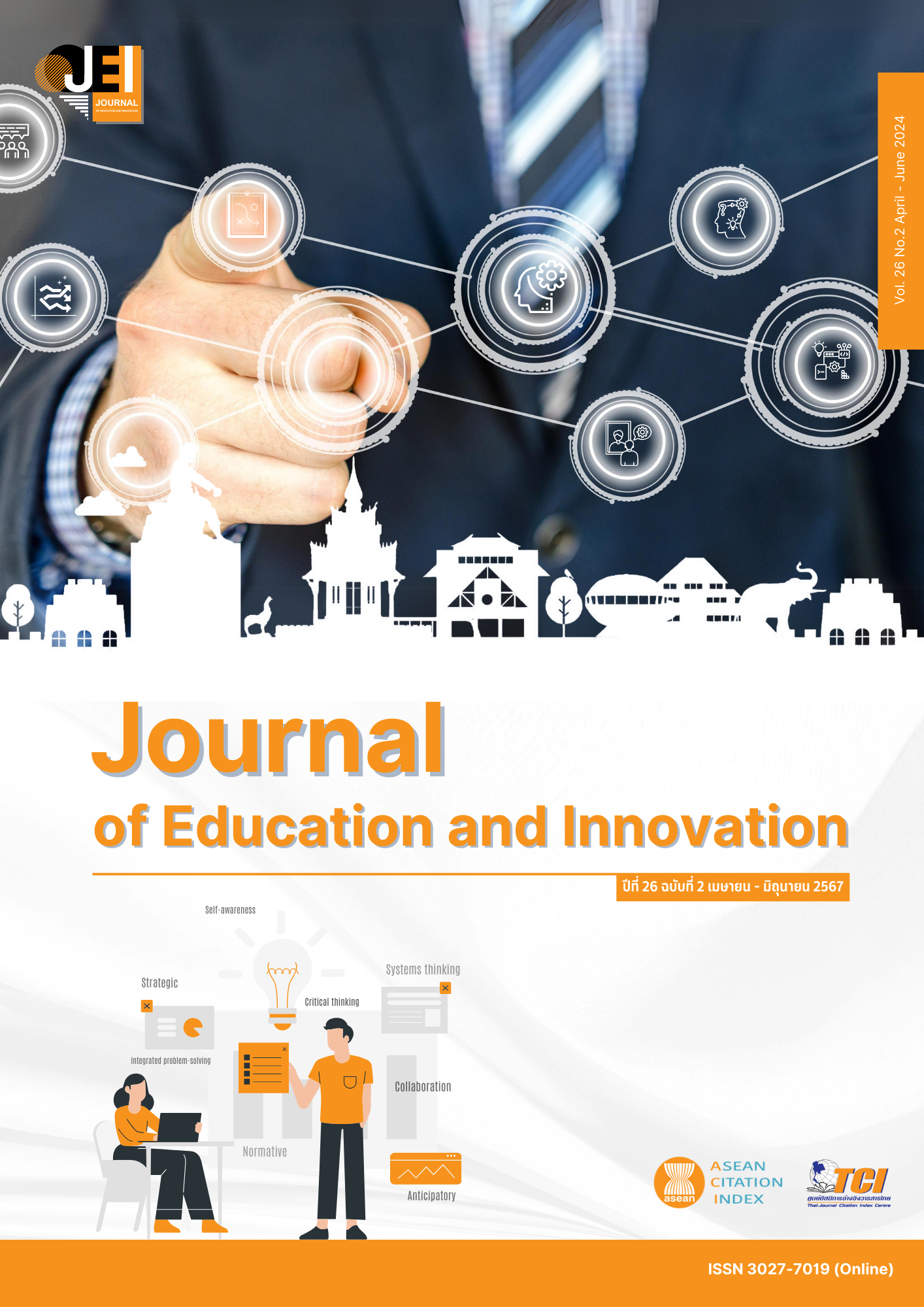THE DEVELOPMENT OF SCIENTIFIC COMMUNICATION COMPETENCY ON DNA TECHNOLOGY USING CONTEXT OF THE CHANGING WORLD AFTER THE COVID-19 EPIDEMIC BASED LEARNING FOR GRADE 10 STUDENTS
Main Article Content
Abstract
The objectives of this action research were 1) to study a guideline of learning management using the context of global changes after the Covid-19 epidemic as a base on DNA technology to develop scientific communication competency of grade 10 students and 2) to study the development of scientific communication competency from such the learning management. The participants were 38 grade 10 students from a large secondary school in Phitsanulok province. The research tools consisted of the learning management plans based on the context of global changes after the Covid-19 epidemic, the reflection form for learning management, the activity sheet and the assessment of scientific communication competency. The content analysis was used to data analysis which were for verified the trustworthiness by the resource triangulation and method triangulation. The results showed that the good practice consists of the selection of news about changes in the world after the Covid-19 epidemic before the lesson can arouse interest and foster discussion of news related to knowledge of DNA technology. Working together in small group activities promote the exchanging of scientific knowledge and communication including the selection of appropriate communication strategies in creating works and presenting scientific knowledge that makes science understandable for others. In addition, implementation of the context of the changing world after the Covid-19 epidemic based learning showed that, the level of scientific communication competency has increased from the beginner level to the proficiency level.
Article Details

This work is licensed under a Creative Commons Attribution-NonCommercial-NoDerivatives 4.0 International License.
The owner of the article does not copy or violate any of its copyright. If any copyright infringement occurs or prosecution, in any case, the Editorial Board is not involved in all the rights to the owner of the article to be performed.
References
Akara-Aree, N. (2017). Things you may not know about genetics. IPST Magazine, 45(205), 8-13.
Boonrueng, Y., Nugultham, K., & Vigitwongwan, J. (2021). Scientific Knowledge Transfer through context-based learning on the effects of heat on matter. Journal of Education and Human Development, 5(1), 71-82.
Bunpeng, A., Tanak A., & Wattana-amorn, P. (2015). Development of grade 10th students’ application abilities about chemical reaction using context-based learning. Journal of Education Review, 30(2), 162-172.
Chatakarn, V. (2015). Action research. Suratthani Rajabhat Journal, 2(1), 29-49.
Department of Academic Affairs. (2003). Implementation of basic education curriculum and learning management in science B.E. 2544. Bangkok: Kurusapa Ladprao Printing.
Fanchian, N. (2019). Promotion of Thai education to cope with the VUCA world. Retrieved on May 3, 2022
from http://www.trueplookpanya.com/blog/content/76134/-blog-teaartedu-teaart
Goldina, A., & Weeks, O. I. (2014). Science café course: an innovative means of improving communication skills of undergraduate biology majors. J Microbiol Biol Educ, 15(1), 13-7.
Jomnum, S. (2014). The Effects of Context-Based Learning about the Ratio and Percentage on Mathematical Achievement, Critical Thinking Ability and Learning Curiosity of mathayomsuksa II Students (Master thesis). Bangkok: Srinakharinwirot University.
Kaewpikul, S. (2012). Development of mathematical activity in active learning using pair learning and brain exercises to promote mathematical achievement and learning happiness of low achiever mathyomsuksa II students (Master thesis). Bangkok: Srinakharinwirot University.
Khamsakul, B. (2015). Thai language for communication. Retrieved on July 3, 2022, from https://sites.google.com/site/thaicommunication 83/ bth-thi-1-kar-suxsar
Klaynil, S., Dejsri, P., & Pramojnee, A. (2008). Knowledge and competency in science for the world of tomorrow. Nonthaburi: 21st Century Company Limited.
Matthayomnan, P. (2015). Developing grade 10 students’ teamwork in equilibrium using science activity learning packages based on STEM Education (Master thesis). Ubon Ratchathani: Ubon Ratchathani University.
Office of the Education Council (ONEC). (2019). Research and development results of the competency framework for lower primary level learners for basic education courses. Bangkok: 21st Century.
Office of the Education Council (ONEC). (2020). Competency in Thai education in the international arena, year 2020 (IMD 2020). Nonthaburi: 21 Century Company Limited.
Omchaikad, S. (2022). Science communication ability of upper secondary school students learning through inquiry method supplemented with group discussion technique. Journal of MBU; Lanna Campus, 11(2), 97-110.
Pramchoo, J., Sreethunyoo, A., & Mesuk, L. (2010). The effect of using context-based learning activities on grade-11 student learning achievement in chemistry. Srinakharinwirot Research and Development Journal of Humanities and Social Sciences, 2(1), 32-41.
Pongsue, T. (2021). Development of SSCS learning activity cooperated with context-based situations enhancing the scientific communication skills of mathayomsuksa 4 students (Master thesis). Maha Sarakham: Mahasarakham University.
Rangabtook, W. (2020). Thai learners’ key competencies in a VUCA World. Journal of Teacher Professional Development, 1(1), 1-11.
Sriprom, P. (2019). The development of context-based learning activities with Infographics to promote science knowledge and attitudes towards science on chemical bonding for Mathayomsuksa 4 students (Master thesis). Phitsanulok: Naresuan University.
Sukying, S. (2017). Context-based learning with news as media in equilibrium topic for developing scientific literacy through of 10th grade students. Journal of Education, 18(2), 31-44.
Thailand Science Research and Innovation (TSRI). (2021). Driving Thailand's science and technology system. Retrieved on July 16, 2022, from https://www.tsri.or.th/th/news/content/596/
The Institute for the Promotion of Teaching Science and Technology (IPST). (2017). Evaluation Framework PISA 2015 project students. Retrieved from https://pisathailand.ipst.ac.th/pisa-2015-framework/
The Institute for the Promotion of Teaching Science and Technology (IPST). (2017). TIMSS 2015 Project Research Report. Bangkok: Institute for the Promotion of Teaching Science and Technology.
World Economic Forum. (2015). New vision for education unlocking the potential of technology. Retrieved 19 July 2565, from https://www3.weforum.org/docs/WEFUSA_NewVisionforEducation_Report2015.pdf


